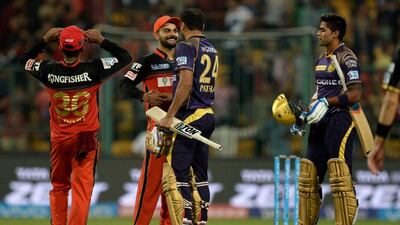Until Tuesday, which marked the halfway point of the ninth season of the Indian Premier League (IPL) in terms of matches played, 22 of the 30 matches had been won by the team batting second.
At 73 per cent, that is an unusually high proportion of results. It is also a number that has come down significantly as the season has progressed – at one stage 14 out of 15 games had been won batting second, and then 17 out of 21.
Historically the proportion is still far higher than the norm. In the 518 matches of the IPL before the start of this season, sides batting second had won 272 games, or, 52.5 per cent. Given the nature of the format, its evolution over the years, the different conditions it has been played under and the varying strengths of teams, that is actually a remarkably even spread of results.
The best season for chasing sides was 2014, part of which was played in the UAE: sides batting second won 37 of the 60 matches – nearly 62 per cent. Last season was the worst, when only 24 out of the 59 matches – just under 41 per cent - were won by the sides chasing. As an indication of how anomalous this season has been, only two more wins by sides batting second will equal last season’s total number of wins.
• Read more: Rising Pune Supergiants injury crisis and Axar Patel's hat-trick – IPL Week 4 in review
• Also see: MS Dhoni, among his many qualities, also stands apart as evolved wicketkeeper
Is this season anything more than an outlier, as AB de Villiers said in a recent column, and which, as that dropping percentage indicates, will eventually even out into nothing extraordinary by the end? Or is there something more to it, some seminal cracking of a code of chasing?
Empirically speaking, and in certain conditions, chasing in limited overs cricket would generally seem like the preferable option. In the subcontinent, dew can be an issue in the evening when fielders and bowlers struggle to grip the ball.
Chasing a target can also focus batsmen’s minds that much better. They know exactly how much they have to get, how the pitch is playing and which bowlers to target when.
Teams batting first, on the other hand, are stepping into the unknown. They have a blank canvas in front of them. They have to work out the pitch and work their way into a total, guardedly if they lose wickets upfront.
They have to keep calibrating their expectations as the innings progresses. Sometimes you push too hard, sometimes you do not push enough; batting second you always know how hard you need to be pushing.
But numbers, as we have seen with the IPL over eight seasons, do not necessarily bear this out. Even in Twenty20 internationals historically, sides batting second have won 47 per cent of the games; as a probability, batting second is almost equally likely to pay dividends.
What we can say is that openers have been immense in this year’s tournament. Five of the top six run-getters before the start of Tuesday’s games were openers (Virat Kohli, who is top, has played one game at one-down).
But specifically, they have thrived this season batting second, which means that more often than not they have broken the back of a chase with the opening stand. After 15 matches the average opening stand while chasing was 55.07. There were eight 50-plus opening stands in that sample.
Since then a flattening out of the trend has begun. After 30 matches now, for instance, the average opening stand in a chase has dipped to 40.45 and there have only been two more 50-plus stands since.
Openers have continued to thrive individually. There were 16 fifties by chasing openers in the first 15 games and there have been eight in the last 15 games. Already, 11 times this season openers have batted through a chase undefeated; the most in any full season is 15, in the very first year in 2008.
As the season progresses, however, De Villiers’ assertion that the trend was nothing more than “a statistical anomaly” is ringing truer.
Follow us on Twitter @NatSportUAE
Like us on Facebook at facebook.com/TheNationalSport

